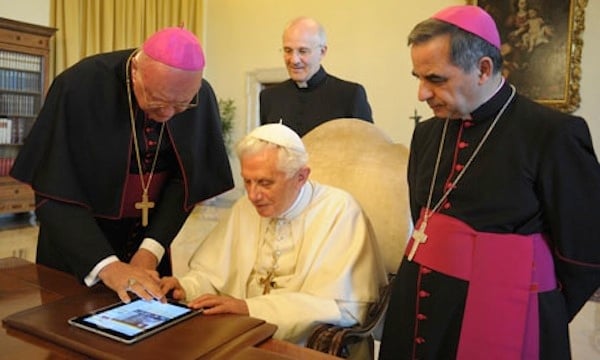
Pope Benedict XVI uses an iPad. Source: The Guardian/Observattore Romano
When I think back to 2012, I will inevitably think back to Twitter as the lens through which I saw elections, natural disasters, and major political events unfold. When it comes to foreign policy and cross-border issues, Twitter is playing more of a role than ever. Highlights from the past year in the international Twitterverse include:
- In China, the Xinhua (government-owned) news service has a Twitter account, much to understandable ire of many people — Twitter is one of the numerous websites blocked by China’s firewall.
- “Twiplomacy is the first-ever global study of world leaders on Twitter.” Enough said — check out the report here.
- Pope Benedict XVI (@pontifex) first Tweeted on December 12. Twitter’s manager of social innovation, Claire Diaz Ortiz, who worked with the Vatican to establish the Pope’s Twitter account, made the following point about religion and Twitter in a Wired interview:
…religious content on Twitter has an incredible spread. It does very well. Religious leaders punch far above their weight; a religious leader might have 1/50th the number of followers of a large celebrity but can still generate more retweets and more favorites and more engagement.
Only on Twitter for about two weeks, @pontifex currently has just fourteen Tweets, but well over 1.3 million followers.
- During this November’s war in Gaza and Israel, both Israel and Hamas had a significant social media footprint; as the casualties and damage mounted, they posted Tweets designed to capture hearts and minds. The conflict’s presence on other social media sites also became complicated. According to Reuters, senior Google executives such as chairman Eric Schmidt and CEO Larry Page became personally involved in deciding whether Google-owned YouTube should block a video that the Israel Defense Force posted of the airstrike on Hamas commander Ahmed Al-Jaabari, who was killed (the video ultimately stayed).
- At the beginning of 2012, Twitter established a policy that would allow it to block content, on the country level, that individual countries consider illegal. Twitter fell under vehement criticism from those who claimed that the company was supporting censorship. Twitter acted on this policy for the first time in October when German authorities asked Twitter to block a neo-Nazi group’s account. As Future Tense’s Will Oremus noted at the time, drawing a contrast between the initial anger over the policy and the reaction to the first ban, “By coincidence or design … the first instance of Twitter applying its new censorship policy is one that seems likely to provoke outrage from only the most ardent free-speech advocates.” To me, the overall reaction to Twitter’s censorship policy embodies the complicated relationship that many of us in even the most democratic societies have with free speech (here, the hateful actions of Westboro Baptist Church come immediately to mind).
What does Twitter in 2012 augur for Twitter in the future? While various governments keep working to limit citizens’ access to Twitter (and Facebook, Google, the news, etc.) these citizens will keep pushing and innovating to surpass these barriers. That being said, widespread use of the Internet and social media does not necessarily translate into open societies. While many of us are captivated by the ways that young, liberal protesters throughout the world use Twitter to organize themselves, I think that Twitter is rightly starting to be seen simply as a tool that people across the political spectrum use to convey information. Indeed, war in Israel and Gaza shows how Twitter is becoming the newest front in the public relations of violent conflict.
In the aftermath of Hurricane Sandy, I had various conversations with New York friends about the pros and cons of Twitter in disaster situations; during the hurricane, Twitter had been used to spread important information about safety and recovery as well as intentionally false and malicious information. On one hand, I feel that Twitter is neither inherently good nor inherently bad — it is simply another medium for communication, and it is up to every individual to figure out how she or she will use it. As media goes, however, Twitter moves at an unprecedented speed, making the job of those who hope to use it responsibly and effectively all the more daunting and exciting. Regardless, whether Twitter was used to spread false rumors, vital breaking news, messages of hostility, or messages of tolerance, understanding, and unity, Twitter was inextricable from over 200 million users’ experience of of life in the 21st century.
***
Readers and fellow bloggers: what were the most memorable Tweets/Twitter developments this year?